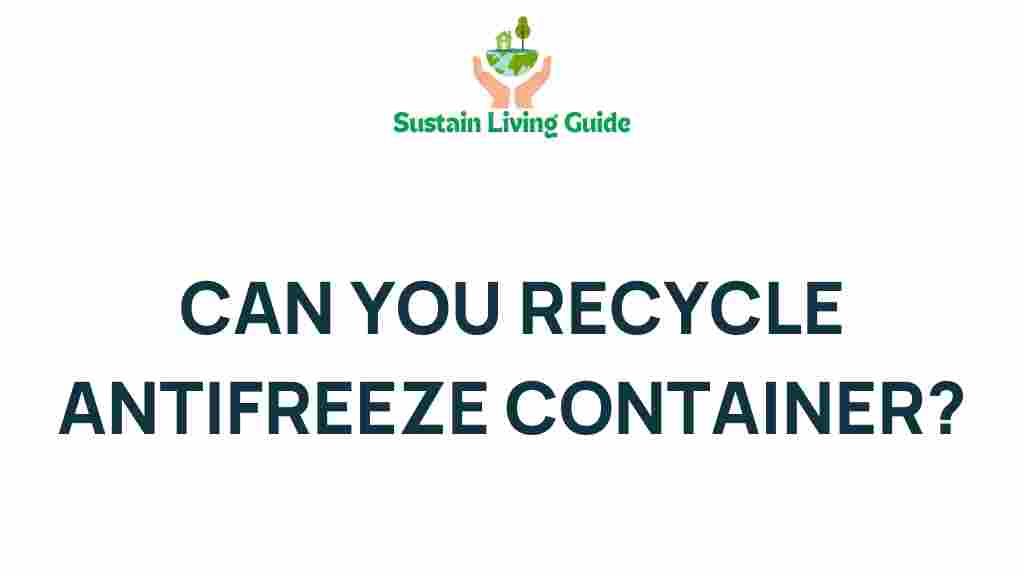Antifreeze Recycling: Unlocking the Mystery of Antifreeze Containers
When it comes to vehicle maintenance, antifreeze is crucial for ensuring that your engine runs smoothly, especially in extreme temperature conditions. However, what happens to the containers that hold this essential fluid? Many people are left wondering if they can recycle antifreeze containers and what the proper procedures are. In this article, we will explore the intricacies of antifreeze recycling, provide a step-by-step process, and offer troubleshooting tips to make your recycling efforts more efficient.
Understanding Antifreeze and Its Environmental Impact
Antifreeze, commonly made from ethylene glycol or propylene glycol, is a chemical compound used primarily in vehicle cooling systems. While effective for preventing freezing and overheating, improper disposal of antifreeze containers can pose significant environmental hazards. Here’s why:
- Toxicity: Ethylene glycol is toxic to humans and animals if ingested.
- Pollution: Improper disposal can lead to soil and water contamination.
- Waste Management: Many landfills do not accept hazardous materials like antifreeze.
Given these concerns, it’s essential to understand the importance of proper antifreeze recycling.
Can You Really Recycle Antifreeze Containers?
The straightforward answer is: yes, but with specific conditions. Not all antifreeze containers are recyclable, and those that are must be processed correctly. Here’s a deeper look:
- **Type of Material:** Most antifreeze containers are made from high-density polyethylene (HDPE), which is recyclable. However, if the container has been contaminated with other substances, it may not be accepted for recycling.
- **Local Regulations:** Recycling capabilities can vary by region. Always check with your local waste management authority to confirm what can be recycled.
Step-by-Step Process for Antifreeze Recycling
Recycling antifreeze containers can be a straightforward process if you follow these steps:
Step 1: Check Local Guidelines
Before recycling, check with your local municipality or waste management facility for specific guidelines regarding antifreeze container recycling. Some areas may have dedicated facilities for hazardous waste.
Step 2: Properly Clean the Containers
To prepare your antifreeze containers for recycling, ensure they are clean and free from residual antifreeze. Follow these steps:
- **Rinse:** Rinse the container thoroughly with water.
- **Dry:** Allow the container to dry completely.
- **Remove Labels:** If possible, remove any labels that could contaminate the recycling process.
Step 3: Dispose of Antifreeze Properly
Do not pour leftover antifreeze down the drain or on the ground. Instead, take it to a hazardous waste disposal site. You can often find local hazardous waste collection events or permanent disposal facilities.
Step 4: Recycling the Containers
Once your antifreeze containers are cleaned and dry, you can recycle them in the following ways:
- **Curbside Recycling:** If your municipality accepts HDPE plastics in curbside recycling, place the containers in your recycling bin.
- **Drop-off Centers:** Some recycling centers may accept them directly. Check ahead to ensure they take antifreeze containers.
Troubleshooting Common Issues
While recycling antifreeze containers is relatively simple, you might encounter some common issues. Here are solutions to help you navigate these challenges:
Problem 1: Containers Not Accepted by Local Recycling Facilities
If your local recycling facility does not accept antifreeze containers, consider:
- **Contacting Local Waste Management:** They may offer alternative disposal options.
- **Seeking Out Specialized Centers:** Some specialized recycling centers focus on hazardous waste and might accept your containers.
Problem 2: Residual Antifreeze in Containers
Residual antifreeze can contaminate the recycling process. If you find it difficult to clean the containers:
- **Use Soapy Water:** A mixture of soapy water can help break down any leftover antifreeze.
- **Seek Help:** If unsure, reach out to a professional recycling service for advice.
Problem 3: Confusion About Different Types of Antifreeze
There are different types of antifreeze, such as:
- Ethylene Glycol: The most common type, highly toxic.
- Propylene Glycol: Less toxic and often used in food applications.
Ensure you correctly identify the type of antifreeze before recycling.
Benefits of Recycling Antifreeze Containers
Recycling antifreeze containers offers numerous benefits:
- Environmental Protection: Reduces the risk of toxic substances entering the ecosystem.
- Resource Conservation: Recycles materials that can be used to create new products.
- Community Responsibility: Promotes a culture of sustainability and responsible waste management.
Conclusion: Making a Difference with Antifreeze Recycling
In conclusion, recycling antifreeze containers is not only possible but essential for environmental protection. By following the steps outlined in this article, you can ensure that you dispose of these containers responsibly. Always remember to check local regulations and guidelines, clean your containers thoroughly, and find the right disposal or recycling option in your area. Your efforts can contribute significantly to a healthier planet.
For more information on hazardous waste management, you can visit this informative resource. Additionally, consider learning more about general recycling practices at this site.
By unlocking the mystery of antifreeze recycling, you take a proactive step towards maintaining a cleaner and more sustainable environment.
This article is in the category Waste and created by SustainLivingGuide Team
